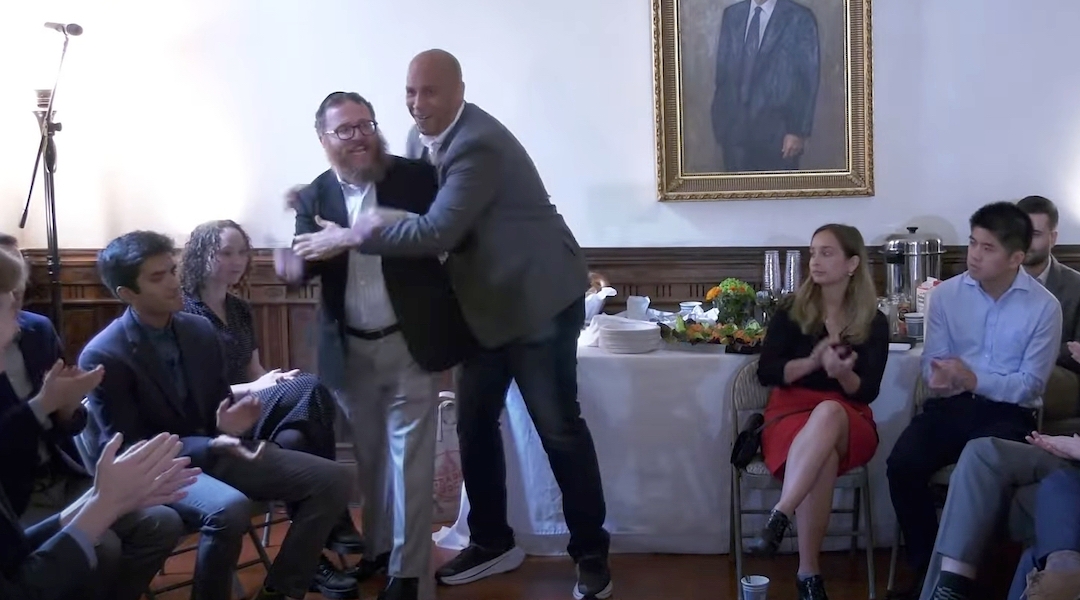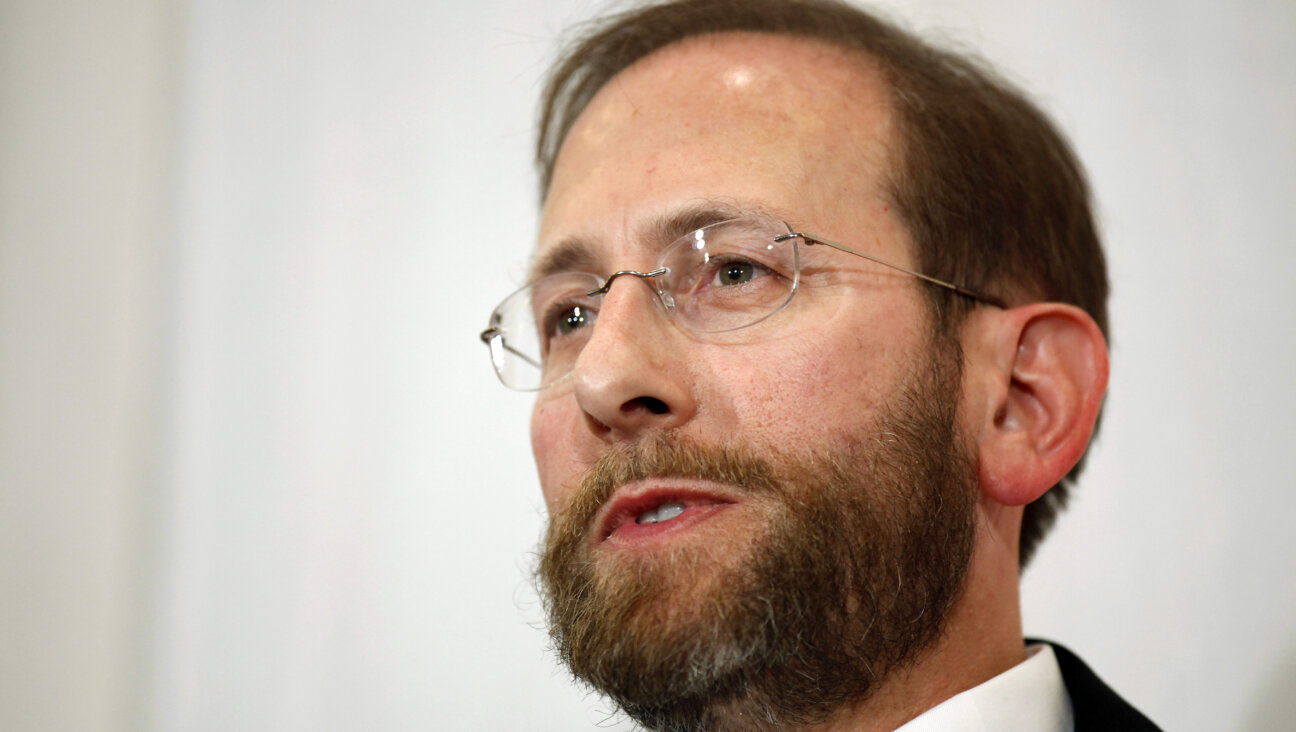Waking Up the World to a Resurgence of Antisemitism
Phyllis Chesler has made a career out of challenging the status quo. With over three decades of activism under her belt, the radical feminist author has exposed sexism in the field of psychology, fought against what she calls “gender apartheid” and, most recently, criticized women for their harmful, unsisterly ways.
Now, however, Chesler — a psychologist and scholar — is directing her fiery determination to a decidedly different cause: defending Israel, and Jews, against the violent crescendo of antisemitism in the Middle East, Europe and, most alarmingly, progressive intellectual circles.
“I sometimes wonder whether being Jewish defines my intellect more than being a woman,” said Chesler, whose stellar career was launched in 1972 with the publication of her first book, “Women and Madness” (Doubleday).
Chesler, with her bright red hair, resolute statements and bulky, bold jewelry to match, is a presence with a capital “P.” And this evening, sitting in the dining room of her townhouse in the trendy Park Slope section of Brooklyn, she’s riled up. She’s jumping out of her seat, literally, as she decries “the betrayal of the truth — and of the Jews — by Western intellectuals.”
“I want to wake the world,” Chesler said in her passionate, soundbite-ish style. “It’s as if the whole world has been sleeping — and dreaming, ‘Hate the Jews.’”
In her latest tome, “The New Anti-Semitism — The Current Crisis and What We Must Do About It” (Jossey-Bass), out next week, Chesler passionately argues that a new, terrifying strain of antisemitism has become de rigueur among a wide swath of global society, from right to left. Often addressing her readers as “friends,” Chesler pleads for sanity; she dispels myths, dispenses horrific facts and offers her vision of an anti-antisemitic future.
To some, the book represents a departure from her radical ways. But, said Chesler, as global antisemitism reaches a fever pitch, “I had no choice but to write this book.”
And while Zionism is far from chic in liberal circles, Chesler hasn’t “recanted” her progressive past. “I’m beyond right wing or left wing, feminist or anti-feminist,” she said. “I care about all that, but I care about the survival of the Jews, the survival of the Jewish state. I will therefore make alliances with anyone who shares that concern. Bring them on!”
“We have Republicans who may disagree with me on domestic or feminist agendas, but if they’re with me on Israel, I’m with them,” she said. “If you want to call me a Republican, a conservative, fine! Maybe that’s what I am right now.”
Chesler is still a feminist, she notes; she’s still proudly, loudly liberal. However, when it comes to left-wing ideologues, she said, “I do choose to part company on the issue of Israel, Jews and Zionism.”
On her academic Internet listservs, she said, the word “Zionist” is akin to a curse word. Today, gay rights activists align themselves with the free Palestine movement — even though in Arab countries, she told the Forward, homosexuality is “punished in terrifying ways.” Feminists — once welcoming of all women — blackball Israelis, as in the case of Marilyn Safir, who was uninvited from an international feminist conference in Turkey in 2000. Chesler writes in her book: “It’s almost as if the feminist world has become a wholly owned subsidiary of the PLO.”
“How do we combat lies that are told over and over again, so much that they gain the dimension of being true?” Chesler said. “There’s an Orwellian misuse of language that’s happening — not calling a thing by its right name is very dangerous.”
Nonetheless, Chesler may appear to be a strange advocate for the Jewish state. As a founder of Women of the Wall — she was an editor, along with Rivka Haut, of the recently published “Women of the Wall: Claiming Sacred Ground at Judaism’s Holy Site” (Jewish Lights, 2003) — Chesler has been involved in 14 years of lawsuits against the State of Israel in an attempt to secure women’s rights to pray at the Western Wall.
And yet, she says her criticisms position her perfectly to defend Israel. “I understand that Israel is not a paradise; it’s as imperfect as an American democracy,” she said. “Clearly, it’s the only country in the region where women could bring such a lawsuit to the Supreme Court and not be stoned to death. Can you imagine that scenario taking place in Tehran?”
Chesler, 62, has always been a Zionist. Growing up in an Orthodox family in Boro Park, Brooklyn, she refused to learn Yiddish and insisted on learning Hebrew instead; against her parents’ wishes, she became involved in the Zionist youth group Hashomer Hatzair. And although she had a love of Jewish learning, “when I couldn’t have a bat mitzvah, I took it very personally,” she said. “I could not accept a second-class, third-class status.”
“Long before feminism started in the world, in my bones, in my destiny, I chose not to accept that,” she said. “In my choice, I lost a great deal, but I also gained a great deal.” In the 1960s, Chesler became a pioneer in the fledgling feminist movement, joining a sisterhood that, after many battles, flung open doors of opportunity through which young American women walk today.
As a student at Bard College in the 1960s, in order to support her “vice” of writing, Chesler decided to become a psychoanalyst. “I could work from home and see patients — or paying guests.”
Indeed, guests seem to be a fixture at Chesler’s home, which sees a stream of visitors. Her house is a mess, she says; after 25 years in her five-story townhouse, the time has come to relocate to a stairless flat on the Upper West Side. Boxes have begun to accumulate in the corners, but her walls still display a lifetime of feminist activism and critical success. Framed photographs of Chesler in her longhaired radical days hang side-by-side with her book jackets and glowing reviews of her work.
Chesler has been married, and divorced, twice — now, she quips, “I’m not in that business anymore.” At 20, she married a Muslim man from Afghanistan (where she lived briefly); at 32, she married an Israeli man, with whom she had her son, now 25. “We’re talking Ishmael and Yitzhak here,” she said. “My connection [to the Middle East] is a very real one.”
With “The New Anti-Semitism,” Chesler acknowledges that she was somewhat apprehensive tackling such an enormous, important subject in which she had no formal training. She feared that what she had to say might not be good enough. “I’m not an expert,” she admitted, adding, “Sometimes it’s the passionate and personal voice that’s everything.”
Passion is something Chesler has in great amounts. When asked, for example, where the pro-Israel voices on the left are, Chesler cried, “Hineni! Here I am!”
“One does not exit from Jewish history just because one now has a Jewish state,” Chesler lamented.
Instead, she said, we must work for a world free of antisemitism; we must discourage the intense gaze on Israel — “a distracting luxury,” said Chesler, given the world’s problems such as drought and AIDS — as well as form alliances, discourage antisemitic myths and spread truths.
“When the City of Peace is not at peace, the world’s in real trouble,” she said. “I’m hoping this book will bring more light into the world.”
The Forward is free to read, but it isn’t free to produce

I hope you appreciated this article. Before you go, I’d like to ask you to please support the Forward.
Now more than ever, American Jews need independent news they can trust, with reporting driven by truth, not ideology. We serve you, not any ideological agenda.
At a time when other newsrooms are closing or cutting back, the Forward has removed its paywall and invested additional resources to report on the ground from Israel and around the U.S. on the impact of the war, rising antisemitism and polarized discourse.
This is a great time to support independent Jewish journalism you rely on. Make a gift today!
— Rachel Fishman Feddersen, Publisher and CEO
Support our mission to tell the Jewish story fully and fairly.
Most Popular
- 1

Opinion The dangerous Nazi legend behind Trump’s ruthless grab for power
- 2

Culture Trump wants to honor Hannah Arendt in a ‘Garden of American Heroes.’ Is this a joke?
- 3

Opinion A Holocaust perpetrator was just celebrated on US soil. I think I know why no one objected.
- 4

Culture Did this Jewish literary titan have the right idea about Harry Potter and J.K. Rowling after all?
In Case You Missed It
-

Culture I have seen the future of America — in a pastrami sandwich in Queens
-

Culture Trump wants to honor Hannah Arendt in a ‘Garden of American Heroes.’ Is this a joke?
-

Opinion Gaza and Trump have left the Jewish community at war with itself — and me with a bad case of alienation
-

Fast Forward Trump administration restores student visas, but impact on pro-Palestinian protesters is unclear
-
Shop the Forward Store
100% of profits support our journalism
Republish This Story
Please read before republishing
We’re happy to make this story available to republish for free, unless it originated with JTA, Haaretz or another publication (as indicated on the article) and as long as you follow our guidelines.
You must comply with the following:
- Credit the Forward
- Retain our pixel
- Preserve our canonical link in Google search
- Add a noindex tag in Google search
See our full guidelines for more information, and this guide for detail about canonical URLs.
To republish, copy the HTML by clicking on the yellow button to the right; it includes our tracking pixel, all paragraph styles and hyperlinks, the author byline and credit to the Forward. It does not include images; to avoid copyright violations, you must add them manually, following our guidelines. Please email us at [email protected], subject line “republish,” with any questions or to let us know what stories you’re picking up.















